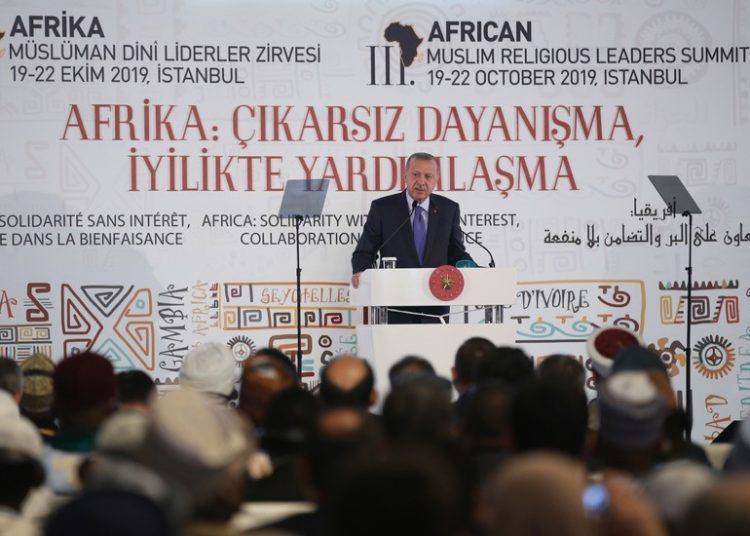Nordic Monitor
At an African event held in Istanbul, Turkish President Recep Tayyip Erdoğan capitalized on religion and political sensitivities in Africa to expand his radical Islamist message and extend his government’s influence on the continent.
Speaking at the 3rd African Muslim Religious Leaders Summit, Erdoğan pulled out all the stops in slamming the Western powers and used the occasion to talk about how Turkey has been fighting what he called neo-colonialists and imperialists.
The Africa event was organized by Turkey’s Religious Affairs Directorate (Diyanet), an ideological and political state apparatus tasked with spreading Erdoğan’s political Islamist ideology both inside and outside the country. Under Erdoğan’s rule, the Diyanet’s remit and range of activity have expanded, and it has become an important tool in Turkish foreign policy.
Speaking at the summit, Erdoğan slammed the United Nations and Western countries over the Rwanda genocide and Turkey’s military operation in northern Syria. “The Western world and the UN just watched the brutal killings of 800,000 people in Rwanda over the course of three months. … Those who impose arms embargoes on us today due to Operation Peace Spring [in northern Syria] provided arms and ammunition to the bloody murderers in those days. Despite the ongoing atrocities on the ground, the Western states did not even think of stopping the sale of arms to the murderers,” he said.
In his speech Erdoğan also accused Western states of “being behind the civil war” in Somalia, of “interfering in the conflict” in the Central African Republic and of “supporting the war barons” in Libya.
Moreover, President Erdoğan accused Christian missionaries of changing the demographics of Africa and of converting African Muslims under the protection of the Western powers. “Although only 7 percent of the African population was Christian in the early 1900s, today Christians constitute 55 percent of the continental population. … Muslims have become minorities in many African countries,” Erdoğan said.
President Erdoğan continued lambasting Western countries, saying: “As a country and a people, we have never been after gaining prosperity through any society’s natural resources, work, blood or sweat. We have never looked down on anyone because of their language, skin color or faith. Turkey has never approached the continent for the sake of its resources of gold, diamonds or oil. Turkey has gone to wherever it has gone to build and develop throughout its history.”
Praising Turkey’s foreign policy approach and his relations with the African people, Erdoğan said: “No matter which country we visit in Africa, both state officials and the people show us genuine affection. Inspired by our faith and values and with this unique past of ours on the continent, we, as Turkey, knock on the door of every friend, heal the wounds of every heart and cooperate with all the countries in Africa. We advocate for the rights of our African brothers and sisters as strongly as we stand up for our rights on international platforms.”

The head of the Diyanet, Ali Erbaş, and President Erdoğan.
He said the volume of trade between Turkey and African countries continues to increase and recently reached $24 billion, expressing determination that it will exceed $50 billion in the near future.
“We increased the number of Turkish embassies on the African continent from 12 to 42,” Erdoğan said, noting that Turkey has also bolstered its presence in Africa through charities and relief agencies such as the Turkish Cooperation and Coordination Agency (TIKA) and the Turkish Red Crescent. “As a result of our efforts, we have brought Turkish-African relations to a level that could not have even been imagined 15 years ago,” Erdoğan noted.
Turkey entered a new period of social, political and cultural transformation under Erdoğan’s rule, starting in 2002. Since then, the structure and activities of the Diyanet have been increasingly synchronized with Justice and Development Party (AKP) policies. President Erdoğan benefited from its network, and the Diyanet became an actor in the imposition of his radical and political Islamist ideology.
In that regard, the Diyanet has assumed a pivotal role in shaping Turkish public opinion on a military operation in northern Syria in accordance with Erdoğan’s political motives. Diyanet President Ali Erbaş recently attended a religious program that took place at the Şahidi Mosque in Muğla to pray for the success of Turkey’s offensive.
“Lord of the Worlds! You said in the Qur’an, ‘It is not you who slew them; it was Allah.’ When our soldiers fire shots, they shoot as is cited in this verse of Yours; let them be accurate. Let them be the victor against the enemy, my Allah! Lord of the Worlds! They are armor to protect your believers. Protect our soldiers with your armor in the best way, my Allah, and protect them against all malice by the enemy!” he prayed.
According to official statistics, the Diyanet manages approximately 87,000 mosques and employs around 120,000 staff, including imams and other religious workers, all of whom are treated as civil servants with regular salaries.












